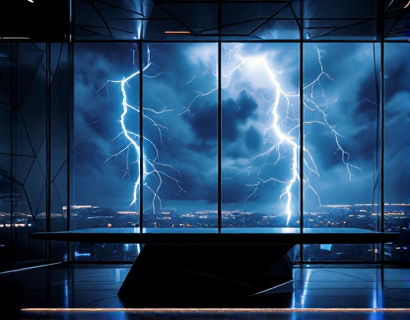Blockchain-Powered Notarization: Revolutionizing Document Security and Accessibility with Decentralized Trust
In an era where digital transformation is reshaping industries, the need for secure, efficient, and transparent document notarization has become paramount. Traditional notarization processes, while established, often suffer from inefficiencies, lack of transparency, and vulnerabilities to tampering. Blockchain-powered notarization emerges as a revolutionary solution, leveraging the inherent properties of blockchain technology to transform document security and accessibility. This article delves into the intricacies of blockchain-driven notarization, exploring its benefits, mechanisms, and the profound impact it has on legal professionals and businesses.
Understanding Blockchain Technology
Before diving into blockchain-powered notarization, it's essential to grasp the fundamentals of blockchain technology. A blockchain is a decentralized digital ledger that records transactions across multiple computers in such a way that the registered transactions cannot be altered retroactively. Each block in the chain contains a cryptographic hash of the previous block, a timestamp, and transaction data. This structure ensures immutability and transparency, as any attempt to alter a block would require consensus from the majority of the network, making it highly secure.
Decentralized Trust in Notarization
Traditional notarization relies on a centralized authority, typically a government-appointed notary public, to verify the identity of the signatories and the authenticity of the document. While this system has served its purpose, it is not without flaws. Centralized systems are prone to single points of failure, corruption, and inefficiencies. Blockchain-powered notarization addresses these issues by distributing trust across a network of nodes, eliminating the need for a central authority.
In a blockchain-based notarization system, the notary's role is transformed into a verifier of digital signatures and the integrity of the document. The process begins with the creation of a digital document, which is then hashed to produce a unique digital fingerprint. This hash is included in a transaction that is broadcast to the blockchain network. Once the transaction is validated by the network, it is added to a block, and the block is linked to the previous block through a cryptographic hash, forming an unbreakable chain.
Enhanced Security and Integrity
The security and integrity of documents are paramount in notarization. Blockchain technology ensures that once a document is notarized, it cannot be altered without detection. The cryptographic hashes and digital signatures create an tamper-evident system. Any modification to the document would change its hash, which would, in turn, invalidate the block it is part of, alerting the network to the tampering attempt.
Moreover, the decentralized nature of blockchain means that the notarization record is stored across multiple nodes, reducing the risk of data loss or manipulation. This distributed storage ensures that the document's authenticity and integrity are preserved over time, providing a reliable and auditable trail.
Streamlined Process and Accessibility
One of the most significant advantages of blockchain-powered notarization is the streamlined process it offers. Traditional notarization involves physical presence, paper documents, and manual verification, which can be time-consuming and cumbersome. With blockchain, the entire process is digital and automated, allowing for instant notarization and verification.
Legal professionals and businesses can upload documents to the blockchain platform, where they are immediately verified and notarized. The digital nature of the process eliminates the need for physical copies, reducing costs and environmental impact. Additionally, the decentralized ledger provides real-time access to notarization records from anywhere in the world, enhancing accessibility and convenience.
Transparency and Trust
Transparency is a core feature of blockchain technology, and it plays a crucial role in building trust in the notarization process. Every step of the notarization journey is recorded on the blockchain, creating a transparent and immutable log. This transparency ensures that all parties involved can verify the authenticity and integrity of the document at any point in time.
For legal professionals, this means a higher level of confidence in the documents they handle. Businesses can ensure that their contracts, agreements, and other critical documents are secure and verifiable, reducing the risk of disputes and fraud. The transparent and tamper-proof nature of blockchain notarization fosters trust among all stakeholders.
Regulatory Compliance and Legal Recognition
As blockchain technology gains traction, many jurisdictions are beginning to recognize and regulate blockchain-based notarization. This legal recognition is crucial for the widespread adoption of the technology. Regulatory bodies are working to establish frameworks that ensure the security, privacy, and legal validity of blockchain notarization.
For instance, some countries have started to issue legal frameworks that acknowledge digital notarization performed on blockchain platforms. This recognition not only validates the process but also opens up new opportunities for international transactions and cross-border collaborations. Legal professionals can now rely on blockchain notarization as a legitimate and enforceable method of document authentication.
Challenges and Considerations
Despite its numerous advantages, blockchain-powered notarization is not without challenges. One of the primary concerns is the regulatory landscape, which is still evolving. Different jurisdictions have varying levels of acceptance and regulation, which can create complexities for global operations. Additionally, the technical complexity of blockchain can be a barrier for some users, requiring education and training to fully leverage the technology.
Another consideration is the interoperability of different blockchain platforms. Ensuring that notarization records can be seamlessly recognized and verified across different systems is essential for widespread adoption. Industry standards and collaborations are necessary to address these interoperability issues.
Future Prospects and Innovations
The future of blockchain-powered notarization is promising, with ongoing innovations set to enhance its capabilities. One area of development is the integration of smart contracts, which can automate and enforce the terms of agreements directly on the blockchain. This integration can further streamline processes and reduce the need for intermediaries.
Another exciting development is the use of zero-knowledge proofs, which allow for verification of document authenticity without revealing the content of the document. This feature enhances privacy and security, making it particularly useful for sensitive documents. As technology advances, we can expect even more sophisticated and user-friendly blockchain notarization solutions.
Conclusion
Blockchain-powered notarization represents a significant leap forward in document security and accessibility. By leveraging the decentralized and immutable nature of blockchain, this technology offers a transparent, secure, and efficient alternative to traditional notarization methods. For legal professionals and businesses, embracing blockchain notarization means adopting a system that enhances trust, reduces risks, and simplifies processes.
As the technology continues to evolve and gain regulatory acceptance, the potential benefits will only grow. The future of document notarization is decentralized, secure, and accessible, thanks to the transformative power of blockchain.










































